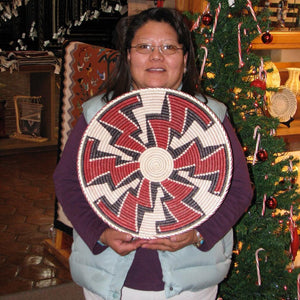
Natalie Edgewater is a member of the San Juan Southern Paiute tribe, whose territory is located in northern Arizona and southern Utah. The Southern Paiute people shared their territory with the Navajo for more than 160 years. It wasn’t until 1989 that the tribe was federally recognized by the United States and in 2000 they were granted 5,400 acres of their own land. Their people remain closely integrated with the Navajo, and most Southern Paiutes have relatives and friends that are Navajo and Hopi.
There are two distinct communities of Southern Paiutes living on the western portion of the Navajo Reservation. The first group lives near Tuba City which is easily accessed by a state highway and offers modern conveniences. The other group lives in a much more remote area on the northeast side of Navajo mountain, where they live a more traditional life focused on farming, herding, and basket-making. Even today, basketry continues to be a major source of income for the Southern Paiute. Natalie is from the remote areas near Navajo mountain.
San Juan Paiute and Ute basket weavers use techniques very similar to the Navajo. One of the best ways to differentiate a Navajo basket from a Paiute is the structure of the foundation. Navajo basket weavers use combinations of three, five, or seven-rod foundations. San Juan Paiute use a four-rod foundation.
Natalie King Edgewater is the daughter of Edith King and the granddaughter of Maryanne Owl. Natalie emerged as a premier basketmaker in the 1990s. Her work showcases her immense talent, careful preparation of materials, and stitches that are consistently tight and even. Her designs are rooted in tradition but also reflect distinct innovations unique to Natalie’s work. Her work can be readily identified by her consistent fine stitching, unique designs, and clear patterns.






